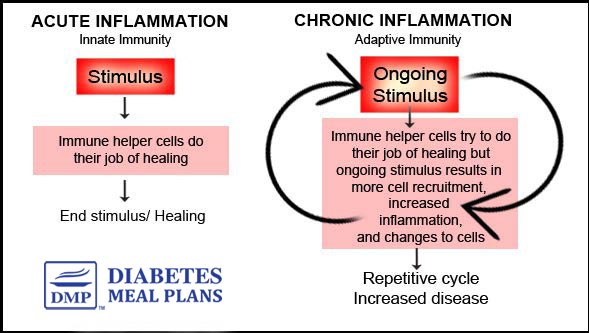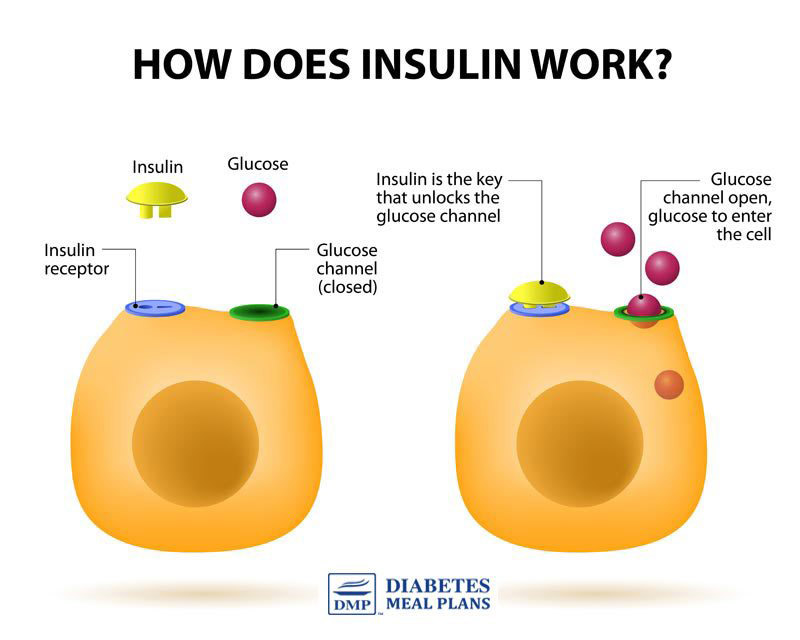Table of Contents[Hide][Show]
People with type 2 diabetes are two to four times more likely to develop heart disease compared to those without diabetes.
Given this significant risk, it’s crucial to understand the intricate connection between diabetes and heart disease, so you can be proactive to reduce your risk of getting heart disease, or improve your health if you already have both heart disease and diabetes.
Let’s look closer at why diabetes often paves the way for heart-related complications.
The Central Role of High Blood Sugar & Inflammation
With prediabetes and type 2 diabetes, both conditions lead to high blood sugar levels – and therein lies the major problem!
High blood sugar is the main thing that sets off a chain of events leading to heart problems.
High blood sugar triggers inflammation in the blood vessels throughout the body.
This inflammation is one of the key mechanisms that contribute to the development of cardiovascular diseases, including atherosclerosis, which is the narrowing and hardening of arteries.

Uncontrolled and ongoing high blood sugar levels is also associated with endothelial dysfunction and oxidative stress. Together these factors create an environment for fatty deposits to build up on vessel walls.
This inflammatory state not only narrows your arteries but can also serve as a launchpad for other risk factors for heart disease, such as high blood pressure, increased levels of small dense LDL particles, and an imbalance in clotting factors.
So, when we talk about managing diabetes to protect your heart, keeping blood sugar levels in check is your primary goal and protector.
The Interplay of Insulin Resistance, Blood Sugar, and Heart Disease
Insulin resistance is a key player in the link between diabetes and heart disease.
Normally, insulin helps your cells absorb glucose from your bloodstream. But when you’re insulin resistant, this process doesn’t work as well, the ‘key’ can’t unlock your cells as efficiently.
The thing is, for most people with prediabetes or type 2 diabetes, your body is overproducing insulin to try to compensate for your high blood sugar levels.

What does this have to do with your heart?
Overproducing insulin is known as hyperinsulinemia, which has a dark side.
Too much insulin can cause the walls of your blood vessels to grow thicker than normal. Thicker walls mean narrower vessels, making it harder for blood to flow, increasing the risk of high blood pressure and heart disease.
Too much insulin is also associated with an imbalance in cholesterol levels, promoting the accumulation of small dense LDL particles, which are particularly harmful to your arteries.
By reducing your blood sugar levels, you reduce circulating insulin, improve insulin sensitivity and decrease inflammation – all of which keep your heart health in better shape.
The Complex Connection Between Lipid Profiles, High Blood Sugar, and Heart Disease
Lipid (cholesterol) profiles don’t exist in a vacuum; they are profoundly influenced by your blood sugar levels.
When blood sugar is high, the liver senses this and shifts its normal metabolism. Instead of processing fats in a way that’s beneficial for your cardiovascular system, the liver starts producing more of the harmful small dense LDL particles while reducing the beneficial HDL cholesterol.
These small dense LDL particles can contribute to plaque buildup in your arteries, a leading cause of atherosclerosis.
But that’s not all. Elevated blood sugar levels can also lead to the accumulation of triglycerides, another type of fat in your bloodstream.
High triglyceride levels are a well-known risk factor for heart disease. Together with high levels of small dense LDL particles and low HDL cholesterol, this creates what is often called a “lipid triad,” a particularly dangerous combination for your heart.
In addition, high sugar levels can cause fats to be stored in undesirable locations, like your liver, your pancreas and even your heart, leading to conditions like fatty liver disease and increased cardiac fat, both of which further elevate your risk of cardiovascular disease.

The Intricate Relationship Between Blood Sugar, Insulin, and Blood Pressure
High blood pressure is a common companion to diabetes and can contribute to heart strain. But again, high blood pressure is related to high blood sugar and insulin levels.
Elevated blood sugar can indirectly lead to high blood pressure by causing damage to the blood vessels, making them less elastic and causing them to constrict. But the story doesn’t end there.
Insulin also plays a key role. Under normal conditions, insulin helps your kidneys filter and absorb sodium. However, when insulin levels are persistently high, as in the case of insulin resistance, this natural balancing act gets disrupted.
The kidneys, influenced by the excess insulin, begin to retain more sodium than they should. This sodium retention increases fluid volume in the body, contributing to higher blood pressure.
Also, insulin resistance can cause the sympathetic nervous system to become more active, leading to further constriction of blood vessels and elevating blood pressure even more.
Other factors
Oxidative Stress
Diabetes promotes oxidative stress, a condition where there’s an imbalance between free radicals and antioxidants in the body. This can lead to cellular damage and has been associated with the development of both diabetes and cardiovascular diseases.
Clotting Factors
Diabetes can affect how your blood clots, making clots more likely. These clots can block blood vessels, leading to heart attacks or strokes. Research shows that diabetic patients have a hyperactive clotting system, further exacerbating the risk of heart-related issues.
So, What Can Be Done To Improve Your Heart Health With Diabetes?
While it sounds grim, the silver lining is that heart disease is preventable and manageable, even if you have diabetes.
Here are a few strategies to consider:
- Blood Sugar Control: This is the one crucial thing you need to focus on, because improving your blood sugar levels, and keeping them in the healthy range, improves everything!
- Healthy Diet: The best way to reduce and maintain healthy blood sugar levels is, naturally with nutrition, like we teach people to do here at DMP.
- When people follow our scientifically proven guidelines, we always see not only their blood sugar improve, but their blood pressure gets better, they lower their triglycerides and improve cholesterol levels, reduce liver fat and reduce medications – that’s the power of nutrition!
- Physical Activity: Exercise is a dual-action tool that can help manage both diabetes and heart disease. Even a 30-minute walk each day can make a difference.
Need help to eat to treat diabetes and heart disease? Join us as a member today.
Receive proven practical support to lower blood sugar, A1c and meds, and keep your health on track.


Leave a Reply